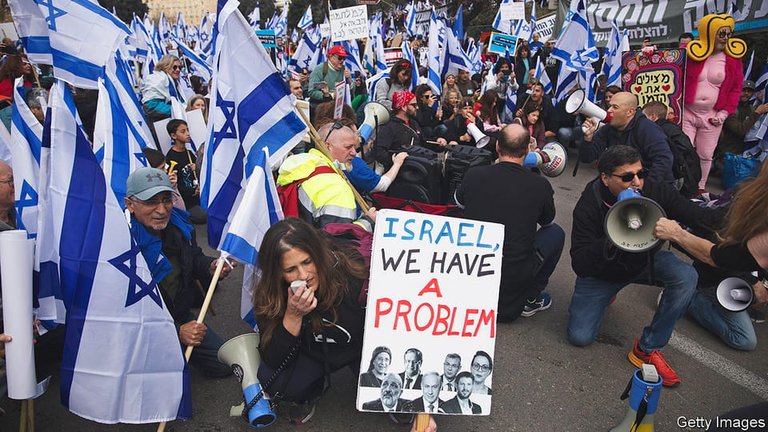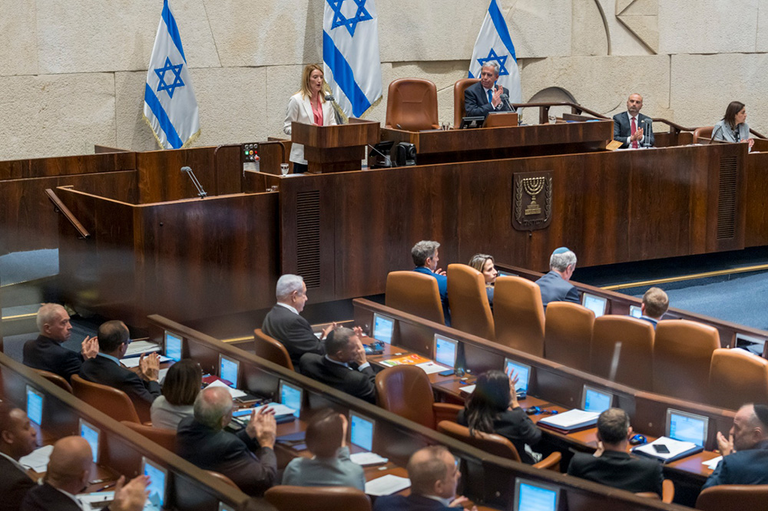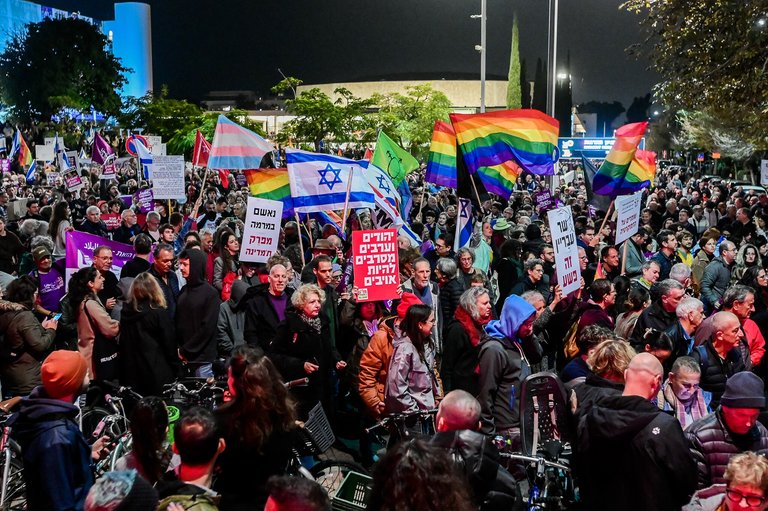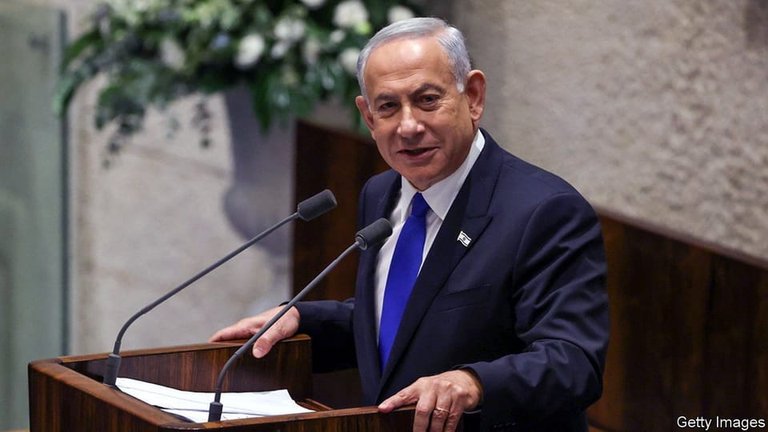
When Netanyahu was sworn in as Israel's prime minister for the sixth time last December, no one expected it to be smooth sailing. His cabinet included a host of unpopular right wing firebrands, and his legislative agenda was nearly as controversial. Perhaps the most contentious part is a bill giving Netanyahu almost complete control over Israel's judiciary and Supreme Court, which has sparked unprecedented protests across Israel's major cities. So in this article, we're going to take a look at that new bill, why it sparked such massive protests and whether Netanyahu can get away with it.
So let's start by talking about the judicial reforms themselves and how Netanyahu justifies them. When Israel became a country after World War Two, it didn't really have the time or political bandwidth to sort out a complicated political system with all of the relevant liberal guardrails. So instead it just went for pure proportional representation. And instead of a formal constitution over time, the Israeli parliament, otherwise known as the Knesset, passed a series of semi constitutional laws known as the basic laws, which became sort of an uncodified constitution over time. However the absence of a formal constitution means that the relationship between Israel's judiciary and the Knesset is pretty much undefined and while this worked for a while in the 90 seconds, the Supreme Court started using a couple of new basic laws related to the rights of Israeli citizens to dismiss various pieces of legislation passed by the Knesset. Obviously, this created a tension between the Supreme Court and the Israeli government, which has sometimes accused the court of being anti-democratic and using controversial and narrow interpretations of the basic laws to dismiss any other legislation that it doesn't like.
Коли Нетаньяху вшосте склав присягу як прем’єр-міністр Ізраїлю минулого грудня, ніхто не очікував, що все пройде гладко. До його кабінету входило безліч непопулярних правих вогнепальців, і його законодавча програма була майже такою ж суперечливою. Можливо, найбільш суперечливою частиною є законопроект, який надає Нетаньяху майже повний контроль над судовою системою та Верховним судом Ізраїлю, що викликало безпрецедентні протести у великих містах Ізраїлю. Тож у цій статті ми розглянемо цей новий законопроект, чому він спричинив такі масові протести та чи зможе Нетаньяху зійти з рук.
Тож давайте почнемо з розмови про самі судові реформи та про те, як Нетаньяху їх виправдовує. Коли Ізраїль став державою після Другої світової війни, у нього насправді не було ні часу, ні політичної спроможності розібратися в складній політичній системі з усіма відповідними ліберальними огорожами. Тож натомість було використано чисте пропорційне представництво. І замість офіційної конституції з часом ізраїльський парламент, інакше відомий як Кнесет, прийняв низку напівконституційних законів, відомих як основні закони, які з часом стали свого роду некодифікованою конституцією. Однак відсутність формальної конституції означає, що відносини між судовою системою Ізраїлю та Кнесетом є майже невизначеними, і хоча це спрацювало деякий час протягом 90 секунд, Верховний суд почав використовувати кілька нових основних законів, пов’язаних із правами ізраїльтян громадянам відхиляти різні законодавчі акти, прийняті Кнесетом. Очевидно, це створило напругу між Верховним судом та урядом Ізраїлю, який іноді звинувачував суд у антидемократичності та використанні суперечливих і вузьких тлумачень основних законів, щоб відхилити будь-які інші закони, які йому не подобаються.

Anyway Netanyahu has apparently decided that he's had enough of this ambiguity and has introduced a bill that would essentially redefine the relationship between the Supreme Court and the Knesset. And he would largely achieve this by giving a lot more power to the Knesset. That's because in its current form, Netanyahu's bill would basically do three things. Firstly, it would give the Israeli government more power to appoint judges who are currently picked by a panel, mostly composed of other Supreme Court justices and lawyers from the like minded Israeli Bar Association. And secondly, it would reduce the court's ability to curtail or dismiss certain laws which relate to stuff like national security. And thirdly, it would introduce a so-called override clause requiring a simple majority of 61 MPs. But in practice, because the government usually controls a majority in the Knesset, this would give the government the power to ignore the Supreme Court on essentially any ruling they didn't like. Now, while he doesn't deny that the bill would represent a drastic rewriting of Israel's constitution, Netanyahu argues that this is a necessary remedy to the Supreme Court's increasingly activist nature. Netanyahu has also accused the Supreme Court of being undemocratic and obstructing the will of the people. And politicians in his government have pointed out that the court doesn't even reflect Israel's wider society.
And to be fair, they do have a point here. Israel's judges are generally more secular and liberal than your average Israeli citizen, and there have been few Arab or Muslim judges on the court in the past, despite the fact that Israeli Arabs make up something like 20% of Israel's population. However, not everyone is convinced by Netanyahu's arguments here. His stubborn attempts to get the controversial bill through parliament have triggered massive protests across Israel, especially in Israel's more urban areas. In fact, last Saturday, hundreds of thousands of Israelis marched through Tel Aviv to protest the new law in what one newspaper called the largest demonstration in the country's history. The protests have also united Israel's usually divided opposition, bringing together tech workers, university students, lawyers, LGBTQ+ associations, center left Zionist parties, Arab groups and even former IDF officers.
У будь-якому випадку Нетаньяху, очевидно, вирішив, що з нього досить цієї двозначності, і вніс законопроект, який істотно змінить відносини між Верховним судом і Кнесетом. І він значною мірою досяг би цього, надавши значно більше влади Кнесету. Це тому, що в його нинішньому вигляді законопроект Нетаньяху в основному робив би три речі. По-перше, це дало б ізраїльському уряду більше повноважень призначати суддів, які зараз обираються комісією, яка переважно складається з інших суддів Верховного суду та юристів із однодумців Ізраїльської асоціації юристів. А по-друге, це зменшить здатність суду скорочувати або відхиляти певні закони, які стосуються таких речей, як національна безпека. І по-третє, це запровадить так звану переважну клаузулу, яка вимагає простої більшості у 61 депутата. Але на практиці, оскільки уряд зазвичай контролює більшість у Кнесеті, це дасть уряду повноваження ігнорувати Верховний суд практично щодо будь-якого рішення, яке їм не подобається. Зараз, хоча він і не заперечує, що законопроект означатиме кардинальне переписування конституції Ізраїлю, Нетаньяху стверджує, що це необхідний засіб від дедалі активнішого характеру Верховного суду. Нетаньяху також звинуватив Верховний суд у недемократичності та перешкоджанні волевиявленню народу. А політики в його уряді зазначали, що суд навіть не відображає ізраїльське суспільство в цілому.
І чесно кажучи, вони тут мають рацію. Ізраїльські судді, як правило, більш світські та ліберальні, ніж середній ізраїльтянин, і в минулому в суді було небагато арабів чи мусульман, незважаючи на те, що ізраїльські араби складають близько 20% населення Ізраїлю. Однак аргументи Нетаньяху тут переконують не всіх. Його вперті спроби провести суперечливий законопроект через парламент викликали масові протести по всьому Ізраїлю, особливо в міських районах Ізраїлю. Справді, минулої суботи сотні тисяч ізраїльтян пройшли маршем через Тель-Авів на знак протесту проти нового закону, який одна газета назвала найбільшою демонстрацією в історії країни. Протести також об’єднали зазвичай розділену опозицію Ізраїлю, об’єднавши технічних працівників, студентів університетів, юристів, асоціації ЛГБТК+, лівоцентристські сіоністські партії, арабські групи та навіть колишніх офіцерів ЦАХАЛу.

And while each of these groups focus on different issues as we see it, there are four distinct oppositions to the new law the main one, though, is a constitutional objection that the law would remove the separation of powers between the judiciary and the parliament that defines almost all liberal democracies and instead open up Israel's politics to the worst excesses of majoritarianism. Now, as I said, Israel already has far fewer checks and balances than your average liberal country. It's only got one legislative chamber, no devolved powers and the head of state, i.e. the president, has no veto over legislation. That means that Israel's judges are basically the only significant check on the power of the government and neutering them would open Israel's democracy up to what political theorists call the tyranny of the majority.
Basically, when there are no checks and the government only needs a majority to be elected, then they're liable to pass laws that violate the rights of minorities who were never going to support them anyway. And this is especially pertinent worry. Given the nationalist character of Netanyahu's government and the fact that they've already introduced a controversial law that would ban, quote, terror supporting Israeli Arabs from running in elections. The second objection, though, is that even if you think Israel's constitution and the relationship between parliament and the courts needs reform, this should be done via cross-party consensus. Israel's former prime minister, for example, has suggested that reform should be designed by a cross-party committee before being put to a popular referendum. And this is part of a wider anxiety about the functioning of Israel's democracy, which has seen five elections in just the last couple of years and might be unable to cope with a whole load of short lived constitutional convulsions.
І хоча кожна з цих груп зосереджується на різних питаннях, як ми це бачимо, існує чотири різні протидії новому закону, однак головним є конституційне заперечення, що закон усуне розподіл повноважень між судовою системою та парламентом. визначає майже всі ліберальні демократії та натомість відкриває політику Ізраїлю для найгірших ексцесів мажоритарки. Тепер, як я вже сказав, в Ізраїлі вже набагато менше стримувань і противаг, ніж у вашій середній ліберальній країні. Він має лише одну законодавчу палату, жодних переданих повноважень, а глава держави, тобто президент, не має права вето на закони. Це означає, що ізраїльські судді, по суті, є єдиною суттєвою гальмівною силою уряду, і їх усунення відкриє ізраїльську демократію перед тим, що політичні теоретики називають тиранією більшості.
По суті, коли немає перевірок і уряду потрібна лише більшість, щоб бути обраним, тоді вони зобов’язані приймати закони, які порушують права меншин, які ніколи не збиралися їх підтримувати. І це особливо доречне хвилювання. Враховуючи націоналістичний характер уряду Нетаньяху та той факт, що вони вже запровадили суперечливий закон, який забороняє, цитую, терор, який підтримує ізраїльських арабів, брати участь у виборах. Друге заперечення полягає в тому, що навіть якщо ви вважаєте, що конституція Ізраїлю та відносини між парламентом і судами потребують реформування, це має бути зроблено через міжпартійний консенсус. Колишній прем’єр-міністр Ізраїлю, наприклад, запропонував, щоб реформа була розроблена міжпартійним комітетом перед тим, як її винести на народний референдум. І це частина ширшого занепокоєння щодо функціонування ізраїльської демократії, яка пережила п’ять виборів лише за останні пару років і, можливо, не зможе впоратися з цілим вантажем короткочасних конституційних конвульсій.

The third objection claims that the bill isn't really about fixing the Constitution, but instead about protecting Netanyahu and his ministers who are currently beset by legal problems. That's because a few days before Netanyahu's government was sworn in, a law was passed to allow his interior and health minister, despite the fact that he had a conviction for tax fraud earlier in the year. The problem is, though, that this law was overturned by the Supreme Court in January, and Netanyahu himself is currently on trial for corruption and bribery relating to commercial relationships he had with certain Israeli media moguls back in the 2010s. So the theory is that this law would basically provide immunity for Netanyahu and his political allies as long as they continue commanding a majority in parliament.
The fourth and final objection is about Israel's economy. That's because Israel's economic miracle is partly attributable to its relatively stable political institutions and its appeal to left leaning tech workers who don't like what they see as Netanyahu's authoritarian efforts. And as a result, many of Israel's tech and business community have joined the protest and two formal central bank governors even sent an open letter to Netanyahu warning that weakening the Supreme Court's independence could affect the country's credit ratings. So that's what the new law does, and those are the objections to it. But what happens next?
Третє заперечення стверджує, що законопроект насправді не про виправлення Конституції, а замість цього про захист Нетаньяху та його міністрів, які зараз страждають від юридичних проблем. Це тому, що за кілька днів до того, як уряд Нетаньяху склав присягу, був прийнятий закон, який дозволяв його міністру внутрішніх справ і охорони здоров’я, незважаючи на те, що на початку року він був засуджений за податкове шахрайство. Однак проблема полягає в тому, що цей закон був скасований Верховним судом у січні, а самого Нетаньяху зараз судять за корупцію та хабарництво, пов’язане з комерційними відносинами, які він мав із певними ізраїльськими медіа-магнатами ще в 2010-х роках. Таким чином, теорія полягає в тому, що цей закон фактично забезпечить імунітет для Нетаньяху та його політичних союзників, якщо вони продовжуватимуть керувати більшістю в парламенті.
Четверте й останнє заперечення стосується економіки Ізраїлю. Це тому, що економічне диво Ізраїлю частково пояснюється його відносно стабільними політичними інститутами та його привабливістю для лівих технічних працівників, яким не подобається те, що вони вважають авторитарними зусиллями Нетаньяху. І як наслідок, багато представників технологічної та бізнес-спільноти Ізраїлю приєдналися до протесту, а два офіційних керівника центральних банків навіть надіслали відкритого листа Нетаньяху, попереджаючи, що послаблення незалежності Верховного суду може вплинути на кредитні рейтинги країни. Отже, це те, що робить новий закон, і це заперечення проти нього. Але що відбувається далі?

Well, despite enormous protests, Netanyahu does seem undeterred. And that's because he claims that the protests are trumped by his election victory in November, which he's described as the mother of all protests. And as such, he's pledged to push on with the reforms. All in all, then, unless one of his coalition partners gets cold feet, it looks like the reforms are set to go ahead. And the main question now is whether Israel's political system can survive the upcoming turmoil. Netanyahu will be hoping that it can, but with protests continuing, that's far from certain.
Що ж, незважаючи на величезні протести, Нетаньяху, здається, не злякався. І це тому, що він стверджує, що протести переважають його перемогою на виборах у листопаді, які він описує як матір усіх протестів. І тому він пообіцяв продовжувати реформи. Загалом, якщо ніхто з його партнерів по коаліції не охолоне, схоже, що реформи продовжаться. І головне питання зараз полягає в тому, чи зможе політична система Ізраїлю пережити майбутні потрясіння. Нетаньяху сподіватиметься, що це вдасться, але враховуючи триваючі протести, це далеко не певно.
Sources/Джерела:
- https://www.economist.com/leaders/2023/02/15/israels-proposed-legal-reforms-are-a-dreadful-answer-to-a-real-problem
- https://www.economist.com/by-invitation/2023/02/14/the-overhaul-of-israels-judiciary-will-maim-its-democracy-says-polly-bronstein
- https://www.bbc.com/news/world-middle-east-64929563
- https://www.economist.com/middle-east-and-africa/2023/02/16/proposed-legal-reforms-could-be-dire-for-israel
- https://www.economist.com/middle-east-and-africa/2022/12/29/israels-new-government-is-the-most-right-wing-ever
- https://www.economist.com/middle-east-and-africa/2023/02/02/israels-government-is-facing-anger-from-new-and-unexpected-quarters
- https://www.economist.com/middle-east-and-africa/2023/01/16/binyamin-netanyahu-rushes-to-take-on-israels-supreme-court
thanks good read!
I'm glad you like it, don't forget to follow me 🙏